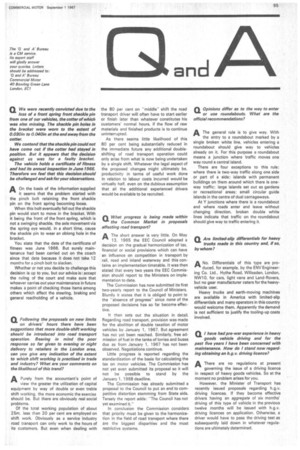rt What progress is being made within the Common Market in proposals affecting road transport?
Page 97

If you've noticed an error in this article please click here to report it so we can fix it.
AThe short answer is very little. On May 13, 1965 the EEC Council adopted a decision on the gradual harmonization of tax,
financial or social provisions which can have an influence on competition in transport by rail, road and inland waterway and this contains an implementation timetable. It was then stated that every two years the EEC Commission should report to the Ministers on implementation to date, The Commission has now submitted its first two-yearly report to the Council of Ministers. Bluntly it states that it is obliged to point to the "absence of progress" since none of the proposed decisions has so far become effective.
It then sets out the situation in detail. Regarding road transport, provision was made for the abolition of double taxation of motor vehicles by January 1, 1967. But agreement has not yet been reached. Similarly, free ad mission of fuel in the tanks of lorries and buses due as from January 1, 1967 has not been observed. Negotiations continue.
Little progress is reported regarding the standardization of the basis for calculating the tax on motor vehicles. The Commission has not yet even submitted its proposal so it will not he possible to stand by the January 1, 1968 deadline.
The Commission has already submitted a proposal to the Council to put an end to com petitive distortion stemming from State aids. Tersely the report adds: The Council has not yet examined it."
In conclusion the Commission considers that priority must be given to the harmoniza tion in the field of road transport where there are the biggest disparities and the most restrictive systems.












































































































































